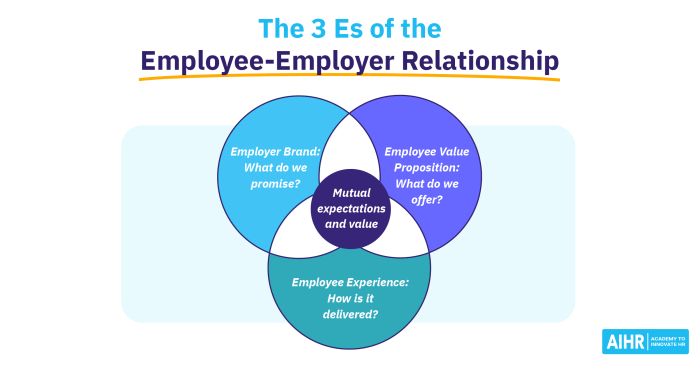Employer trabajador administración inventario empleador – Employer-trabajador administración inventario empleador, or employer-employee inventory management, plays a crucial role in the smooth functioning of any organization. This comprehensive guide delves into the intricacies of this relationship, exploring the legal and ethical implications, the importance of inventory management, and the responsibilities of both employers and employees.
The efficient management of inventory is essential for employers to maintain optimal productivity, reduce costs, and enhance customer satisfaction. This guide provides practical strategies and best practices for effective inventory management, utilizing technology and streamlining processes.
Employer-Employee Relationship

The employer-employee relationship is a complex one, involving a range of roles, responsibilities, and expectations. Employers are responsible for providing employees with a safe and healthy work environment, training and development opportunities, and fair compensation. Employees are responsible for following company policies and procedures, performing their jobs to the best of their ability, and maintaining a positive and productive work environment.
Legal and Ethical Implications, Employer trabajador administración inventario empleador
The employer-employee relationship is governed by a number of laws and ethical principles. These laws and principles protect the rights of both employers and employees, and ensure that the relationship is fair and equitable.
Inventory Management
Inventory management is the process of tracking and managing the flow of goods and materials within a business. Effective inventory management is essential for businesses of all sizes, as it can help to reduce costs, improve efficiency, and increase customer satisfaction.
Importance of Inventory Management
- Reduced costs: By optimizing inventory levels, businesses can reduce the amount of money they spend on storage, transportation, and other inventory-related costs.
- Improved efficiency: Effective inventory management can help businesses to improve their efficiency by reducing the time it takes to find and retrieve items, and by eliminating the need for backorders.
- Increased customer satisfaction: By ensuring that they have the right products in stock at the right time, businesses can increase customer satisfaction and loyalty.
Effective Inventory Management Practices
- Using inventory management software: Inventory management software can help businesses to track their inventory levels, manage their orders, and generate reports.
- Implementing a just-in-time inventory system: A just-in-time inventory system is a system in which businesses only order the inventory they need, when they need it. This can help to reduce inventory costs and improve efficiency.
- Using barcodes and RFID tags: Barcodes and RFID tags can help businesses to track their inventory more accurately and efficiently.
Employer Responsibilities: Employer Trabajador Administración Inventario Empleador

Employers have a number of legal responsibilities towards their employees. These responsibilities include providing a safe and healthy work environment, paying employees fairly, and providing training and development opportunities.
Legal Responsibilities
- Providing a safe and healthy work environment: Employers are responsible for providing their employees with a safe and healthy work environment. This includes providing adequate safety equipment, training employees on safety procedures, and maintaining a clean and well-maintained workplace.
- Paying employees fairly: Employers are responsible for paying their employees fairly and in accordance with the law. This includes paying employees at least the minimum wage, overtime pay, and other benefits required by law.
- Providing training and development opportunities: Employers should provide their employees with training and development opportunities to help them improve their skills and knowledge. This can help to increase employee productivity and morale, and reduce turnover.
Employee Responsibilities

Employees also have a number of responsibilities towards their employers. These responsibilities include following company policies and procedures, performing their jobs to the best of their ability, and maintaining a positive and productive work environment.
Following Company Policies and Procedures
Employees are responsible for following company policies and procedures. These policies and procedures are in place to ensure that the business runs smoothly and efficiently. Employees who do not follow company policies and procedures may be subject to disciplinary action.
Performing Jobs to the Best of Their Ability
Employees are responsible for performing their jobs to the best of their ability. This includes meeting deadlines, completing tasks accurately, and providing excellent customer service. Employees who do not perform their jobs to the best of their ability may be subject to disciplinary action.
Maintaining a Positive and Productive Work Environment
Employees are responsible for maintaining a positive and productive work environment. This includes being respectful of other employees, working well as a team, and helping to create a positive and productive work atmosphere. Employees who do not maintain a positive and productive work environment may be subject to disciplinary action.
Quick FAQs
What are the key responsibilities of employers in inventory management?
Employers are responsible for establishing inventory policies and procedures, maintaining accurate inventory records, and ensuring the safe and secure storage of inventory.
How can technology improve inventory management?
Technology can automate inventory tracking, provide real-time visibility into inventory levels, and facilitate efficient ordering and replenishment processes.
What are the ethical considerations in employer-employee inventory management?
Employers must ensure that inventory management practices comply with all applicable laws and regulations, respect employee rights, and promote fair and equitable treatment.